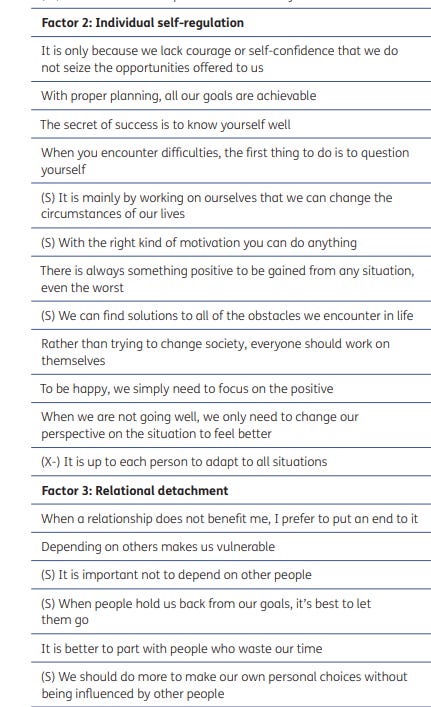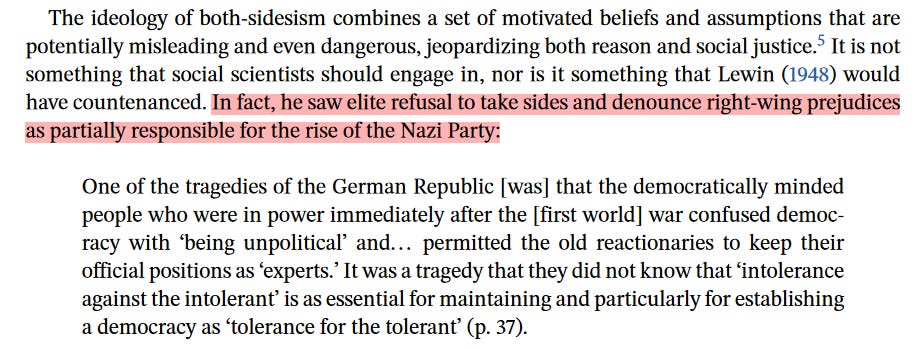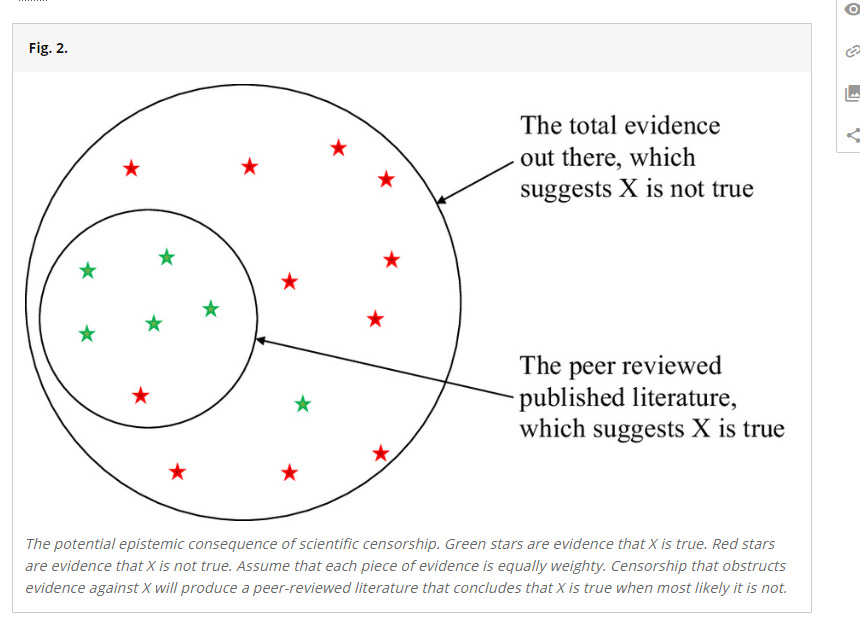The most hypocritical social scientist
John Jost is the epitome of the social scientist as motivated political ideologue. In his paper "Grand Challenge: Social psychology without hubris", his hypocrisy is on full display.
I have been stuck down a rabbit-hole reading much of Jost’s work lately (as seen by my X thread which proved surprisingly popular).
Jost and his SJT have been driving me nuts lately. So I banged out this piece quickly and unsystematically to try to get it out of my head, because it’s super influential social-psychology bullshit like this that makes me want to quit my PhD.
If you enjoy my writing and are inclined to do so, please buy me a a coffee!
John Jost, in his recent editorial review for Frontiers in Social Psychology, argues for a “psychology without hubris”, which is kind of hilarious coming from him.
In the article, Jost lays out the vision for his Frontiers, and addresses some of the crises in social psychology and how he thinks they can be addressed.
In short, his big point is that social psychology has been too focused on trying to copy hard sciences like physics, and should instead refocus on more humanistic, “emancipatory”, social justice goals.
Meanwhile, anyone paying attention knows that it’s (leftist-dominated) social psychology’s broad, uncritical acceptance of ideologically and idealistically congenial social justice goals which have, in part, caused the replication and trust crises in psychology.
He does acknowledge that:
It should go without saying that pursuing emancipatory social relevance does not mean one is entitled to distort the truth or prioritize one’s values over the facts; on the contrary, we assume that truth itself serves an emancipatory function and is essential to the unmasking of bogus ideologies.
But essentially, he’s saying, “we don’t believe that one should distort the truth in pursuit of emancipatory goals, because, luckily for us, the “truth” inherently aligns perfectly with our goals, our values are facts, and thus we are the arbiters of what ideology can be deemed “bogus””.
Against Hubris?
It’s strange that he argues for a social psychology without hubris, when his whole political-scientific project essentially amounts to “everything I believe in is right, and everyone who disagrees with me is suffering from “false consciousness” (and is possibly a Nazi)”.
Jost created “system justification theory” (SJT), one of the most influential theories in social psychology. He openly admits that, in an attempt to explain why people hold beliefs that aren't progressive, radical, or revolutionary enough, he created a theory which could explain them as a form of “false consciousness” in the spirit of Marx and Gramsci. Thus, system justification theory asserts that people will believe in “system justifying” beliefs because they serve a palliative function, and because they have been tricked by “top-down” messaging to work against their own needs.
Basically, anyone who is resistant to rapid and broad scale revolutionary change is a victim of “false consciousness”. And Jost is the prophet whose goal is to remove the scales from our eyes.
Despite the fact that Jost argues (quoting Asch) that social psychologists have been too reluctant to actually “speak to their human participants”, Jost doesn’t actually engage with “system justifiers”. Instead, with great hubris, he simply discounts their beliefs as a sort of brainwashing. He categorically dismisses beliefs which don’t match his, or that he finds troubling, as “false” and serving some palliative function for the poor ignorant folk who aren’t sufficiently revolutionary—who can’t see what’s good for them.
Hypocrisy
He also states in the review article above, that much of the crisis of social psychology results from authors “reliance upon statistically underpowered studies involving a culturally narrow, parochial data base”. He of course doesn’t acknowledge the fact that many of his own studies and others supporting his SJT (which he frequently uncritically cites) used samples like this:
He also points to poor measurement techniques and threats to the validity of the conclusions made throughout social psych as part of the crisis. This despite the fact that his measures of “system justification” and various measure of “rationalization of the status quo” very often contain items measuring neither "justifications” nor “rationalizations”, but merely simple agreement with things like the efficacy of hard work. Additionally, his new measure of “neoliberalism” as an individual-level variable is one of the worst I have seen.
I’m sure very “neoliberal” people (whatever that means) would respond highly to many of those items. But there are about a million other factors affecting responses to those, such as self-efficacy, disagreeableness, optimism, and so on, meaning they will be capturing so much noise irrelevant to the construct of neoliberalism that results and conclusions based on such a scale would be questionable. Meaningful conclusions cannot be drawn from such a messy scale.
Beginning from assumptions
Jost freely acknowledges that his scientific project begins from politically motivated assumptions. The assumption is that people don’t freely and accurately appraise their situations, their fellow group members, and their society, with an awareness of their own needs, goals, and relevant potential tradeoffs to drastic change. Rather, he starts from the perspective that not-sufficiently-revolutionary people’s beliefs are not to be taken at face value, or even engaged with—they arise from a false consciousness, and that he and other activists need to explain to these people what is truly in their best interest.
And he seeks to find results which support his preconceived beliefs about “false consciousness” and its role and effect on people who don’t think like him. This kind of research would not be tolerated from any conservative or capitalist researcher, of course:
As Duarte states above (from another good piece on Jost), “we should not be in the business of investigating why people “resist” the truth of our personal ideologies, and a researcher so motivated will likely struggle to maintain an appropriate scientific posture”.
Everything I believe is right, You guys are all wrong (and Nazis)
This brings us to one of Jost’s latest pieces in which he argues that a recent move among a growing number of social psychologists to try to bring balance to what is an incredibly biased and completely ideologically-captured field, is misguided and dangerous.
It’s a 66 page gish gallop of studies, many of which, if you dig into them, have all the issues (and more) which Jost mentions passingly in his “psychology without hubris” article.
In response to the accusations of liberal bias in psychology, he makes the absurd claim that maybe instead the general population has a “conservative bias”. This is despite the fact that surveys have repeatedly shown that fields like social psych have a 16:1 bias in favor of liberal at least (others have found a 48:1 bias, if i remember correctly). Whereas general political polling show a relatively 50/50 left-right split in the general population (except for in single females who lean predominantly left, though still to a lesser degree than does social-psychology)—which is why elections are so close. So, no. The general population does not have a conservative bias. Psychology has a major liberal bias.
The article devolves, for a while, into basically a democratic party talking-points press release. Levying all the exaggerated and stereotypical claims of white-nationalism and so-on.
And he essentially asserts that both-sideology could contribute to the end of democracy in the West, and the takeover of a new Nazi party. Thus he basically argues for the continuation of an explicitly political social psychology.
He then launches into a lengthy review of the studies arguing for and against parity and symmetry in authoritarianism, bias, prejudice, misinformation susceptibility on the left and the right.
To his credit, he does actually cite and point out the wealth of research showing symmetry, but then he basically just waves them away, instead presenting the studies supporting his claim of disproportionate right-wing dysfunction, in depth.
It’s too long a piece to rebut each study he mentions (and many of them are good studies!). But it is, as I said, a strategically written gish-gallop. There is no way a reader has the time to go and actually check those studies and discern the wheat from the chaff (and peer reviewers certainly don’t). It’s designed to just beat you over the head until you accept the conclusions of the review.
However, as an example I will point out a few issues.
Issues in “Both-Sideology Endangers Democracy and Social Science”
In the section on authoritarianism, he claims that Conway’s measure of Left wing authoritarianism (LWA) is
methodologically unsound and ideologically biased. It contains double- and even triple-barreled survey items as well as explicitly political content
But these have long been criticisms of the right wing authoritarianism (RWA) scale, which Jost has been more than happy to use for decades in many poorly run studies with small samples, because it serves his purposes.
In a footnote he acknowledges the issues with the RWA scale, but provides very informal and unsystematic support for the notion that the LWA scale is “much worse”, going on to point out that some of the items don’t tap authoritarian content at all, which, again, is a problem throughout the RWA scale, too (as I point out here in this piece).
He then goes on to describe a study he runs for a non-profit, investigating authoritarianism. He claims that his authoritarianism measure used in these studies measures authoritarianism in a politically neutral, “relatively content free manner”. Key word there being relatively. Let’s take a look at the items:
Jost claims that this measure is politically neutral, and thus the correlations between right wing ideology and authoritarianism based on studies using this measure are evidence for higher authoritarianism among rightists compared to leftists.
But is the measure as “neutral” as he claims?
Many of the terms throughout those items have more relevance to conservatives (terms like “immoral” and “radical”). The final two items (notably, the ones showing the strongest correlation with right-wing ideology, so the ones doing the most work in the analyses), refer to a negative opinion of modern “rights” discourses in favor of a virtue discourse of law and order. The other also refers to “upholding law and order” and cracking down on “crime and immorality”1. Neither of those necessarily imply authoritarianism; law and order and the ability for police to crack down on crime is and always has been a valid part of a liberal democracy, so the degree to which these items tap authoritarianism is not perfectly clear, but let’s take that as a given.
For which part of the political spectrum is “crime”, “law and order”, and “immorality” a bigger deal? The right wing of course. So despite Jost’s claims that his measure of authoritarianism is neutral, it is not. Conservatives will be more likely to endorse these items because they pertain more to conservative ideology, they contain more conservatively coded terms. And this perfectly explains why his results show correlations (though only moderate) between right wing ideology and “authoritarianism” based on this scale.
All throughout his “balance is bad” paper, he completely ignores the mounting evidence showing that an ideologically committed, homogeneous field can result in an incredibly unreliable, invalid body of scientific work. The widespread alignment of researcher biases, presuppositions, and political goals alters the incentives of peer review, dictates which questions get asked in research, how they get asked, how constructs get measured2, how data is interpreted, which competing explanations get elevated over others, what studies get published, and so on.
All of this results in a body of published literature which looks like this:
There is now a huge body of work supporting this, but he essentially waves it away and provides a thorough review of studies supporting his claims. He does this despite the well known fact that, as when performing a meta-analysis, garbage in equals garbage out. So providing a review of studies which have been produced during the replication crisis, under an environment of political bias, ideological homogeneity, and lax standards of evidence applied to politically congenial findings, doesn’t really mean much.
No hubris here… My theory simply explains anything and everything I want
Hi SJT theory has been used to explain away basically anything and everything the authors need. But lets look at some of the studies in the paragraph above:
The Jost (1997) paper is one of those old papers you just know was p-hacked and poorly run. It involved unnamed “expert raters”, no data availability, no oversight on exclusions or lab conduct, and some pretty marginal findings, which I guess could be supportive of their theory, but there are also a whole host of other explanations that go entirely unconsidered. Again, the study has sampling issues that Jost himself now denounces, despite not retroactively questioning his own studies.
The Obrien et al. (2012) paper used sample like this:
And performed experiments with highly questionable validity and a whole host of unchecked and embedded assumptions about the effectiveness of the manipulations (reading a short vignette, etc.). Then they performed underpowered hierarchical regressions analyses on such questionable data. There was a mix mash of findings, some were non or marginally significant, others were significant but specific p-values were not reported. Data is not available. There are exclusions for various reasons, and we must simply take the authors word for it. On a small sample experiment like this, such exclusions could drastically alter results:
Similarly the Kay et al. (2005) paper (Jost was a co-author) is another vignette “post-test only” experiment, with obviously no pre-registration or any sort of insight into decision making. Experimental conduct is essentially a “black box”—who knows how the study was run, how data was coded, who or how many participants were excluded for what reasons, and the samples looked like this:
And so on. Not all of the studies are this bad of course, but many are, especially Jost’s own seminal studies on SJT.
Publication Bias, No surprise
So it’s no surprise that a recent study found evidence of strong publication bias in the SJT literature:
As stated in the article, SJT literature has low estimated replicability, and displays evidence of low power, p-hacking (data snooping, optional stopping and exclusion decisions), and publication bias:
In fact, SJT literature is likely to have lower replicability rates than social psych in general, which is already abysmal.
It’s probably relevant to point out at this point that Jost appears to have a pretty poor opinion or understanding of pre-registration:
He derogatorily describes pre-registration as simply a method for pre-registering in advance some “safe guesses” as to what the results will be.
In actual fact, pre-registration is meant to be used to plan and pre-register in advance the entire research process and the decisions which guided it: from sample recruitment, to manipulations and measurement decisions, to exclusions, to data analysis (even writing and pre-registering the code beforehand), and inference criteria, among other things. This helps prevent p-hacking, poor research design, data manipulation through exclusions and snooping—all the things which were shown to likely be a problem in the SJT literature.
So perhaps it’s no surprise he is not really into pre-registration.
He thinks all of these important research decisions and researcher degrees of freedom should merely be judged, after the fact and with little oversight, by whether other “experts” find them compelling.
But again, once you’ve performed a study, manipulated your results to be congenial to the worldviews of your fellow experts, of course they’ll find the methods compelling. This is just a continuation of the biased, ideological peer review processes we’ve had for decades.
The epitome of the social scientist as motivated political ideologue
Jost is the epitome of the social scientist as motivated political ideologue. He actively advocates against political balance and what he calls “both sideology”. Instead arguing specifically for a liberatory, critical, social-justice oriented social psychology which operates first from it’s own political-ideological assumptions about the world, despite the rapidly growing body of evidence showing that this is exactly how social psychology ended up in a crisis.
He also fails to acknowledge the fact that many people can hold many different conceptions of what constitutes justice (e.g., distributive vs procedural justice) for many valid reasons. Instead he takes it as a given that the modern progressive conception of “social justice” is the right one, and everyone else is wrong. This is despite the fact that many of the axioms and tenets of social justice are demonstrably based on falsehoods and fallacies, and that the elevation of critical social justice in research subverts scientific publishing.
Despite his critique of social psychology’s tendency to try to copy the hard sciences and dress itself up in scientific language to lend itself credence, that’s exactly what Jost has done, cynically, to advance his political project.
If you enjoy my writing and are inclined to do so, please buy me a a coffee!
Fragile masculinity in adolescent boys: On bullshit and "aggressive cognitions".
I recently wrote a thread on X, about a great paper by Christine Reyna that highlights how the ideological homogeneity of social psychology, and the resulting liberal bias (or equalitarian bias) taints the construction and interpretation of psychological scales and other measurements.
Note here that he is also using multi-barreled items, too. After complaining about such items in other scales.
And how bias gets embedded into construct measurements. See Reyna, 2017, and Honeycutt & Jussim (2020) A Model of Political Bias in Social Science Research, Psychological Inquiry, 31:1, 73-85











































Perhaps Jost is the social psychology analog of Mafia Mark (Mark Alfano) in philosophy.
https://www.emilkirkegaard.com/p/mafia-mark-gets-grant-to-study-intellectual-humility-while-planning-to-use-ai-to-identify-enemies
I don't envy your 'crate-digging' into biased social psychology literature, but great article and analysis nonetheless. It cracked me up he was inticing his participant students with candy bars - a little weird for a middle aged dude to do (assuming he is). I'm not well acquainted with SJT, though I have heard of it. Is it regarded well at Massey?